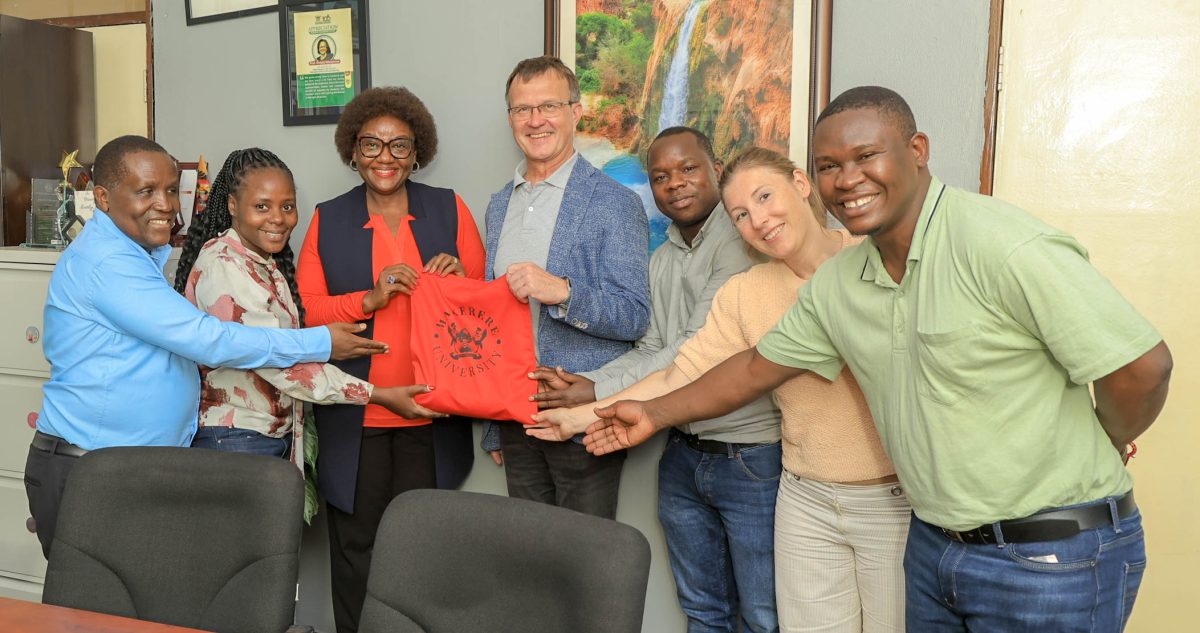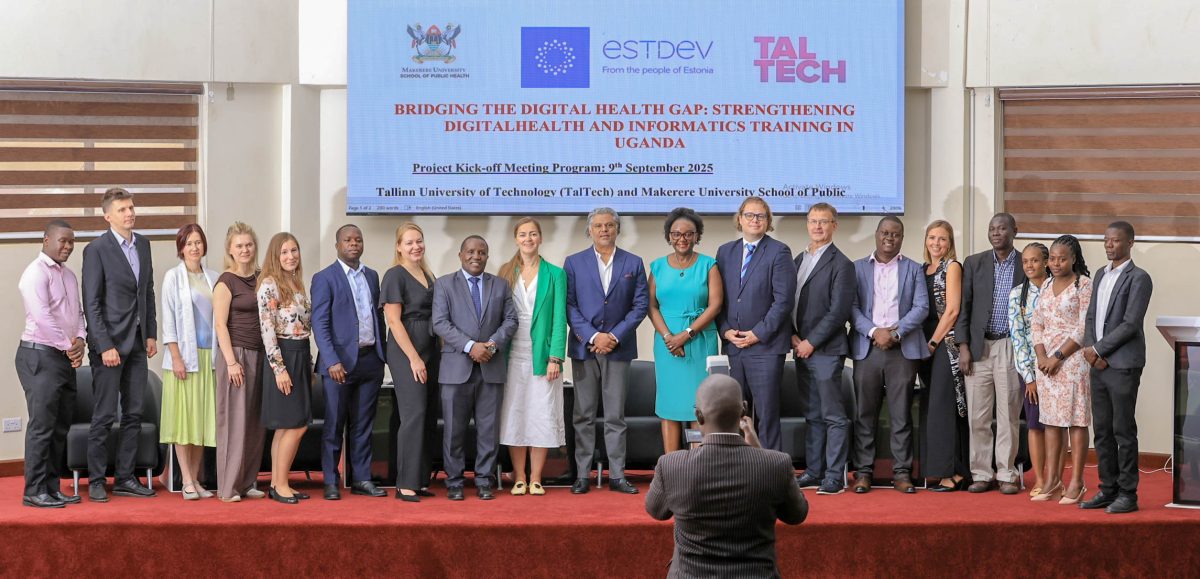Kampala, Uganda – Makerere University School of Public Health (MakSPH) and Estonia’s Tallinn University of Technology (TalTech) have launched a two-year collaborative project to transform health informatics education and practice in Uganda, positioning the country as a regional leader in digital health. Unveiled earlier this month at MakSPH and supported by the Estonian Centre for International Development (ESTDEV), the initiative aims to build a skilled digital health workforce and accelerate Uganda’s transition to a data-driven health system, while aligning the country’s digital agenda with global best practices through partnership.
This strategic collaboration builds on the success of MakSPH’s Master of Health Informatics (MHI) programme. The MHI is one of the eight master’s degrees hosted at the School and was first introduced in 2016, jointly delivered with Makerere University College of Computing and Information Sciences (Mak-CoCIS). The two-year graduate training equips students with skills in health information systems design, data analytics, and digital health leadership through a hybrid model of face-to-face, online, and self-paced learning. So far, since its inception, nearly 50 graduates have completed the programme, many of whom have now gone on to lead national and regional health data initiatives. In August last month, the School received 26 new entrants for the MHI 2025/2026 cohort, reflecting its rising demand.
Now, the new project, launched on September 9, 2025, links TalTech’s MSc in Digital Health, one of Europe’s pioneering programmes introduced in 2009, with MakSPH’s Master of Health Informatics to strengthen curricula, mentor faculty, and give students exposure to global best practices. The goal is to create a skilled workforce capable of leading Uganda’s digital health transformation. The initiative is co-led by Prof. Peeter Ross, Professor of e-Health at TalTech, and Prof. Nazarius M. Tumwesigye, Professor of Epidemiology and Biostatistics at MakSPH. They are joined by Doris Kaljuste, Programme Director of the MSc in Digital Health, and Mr. Michael Anywar, Doctoral Student at TalTech and the initiator of the collaboration, as well as Ms. Irene Wanyana, MHI Programme Coordinator and PhD Candidate at Karolinska Institute, Sweden, and Mr. Chris A. Balwanaki, the Coordinator for the project at MakSPH.
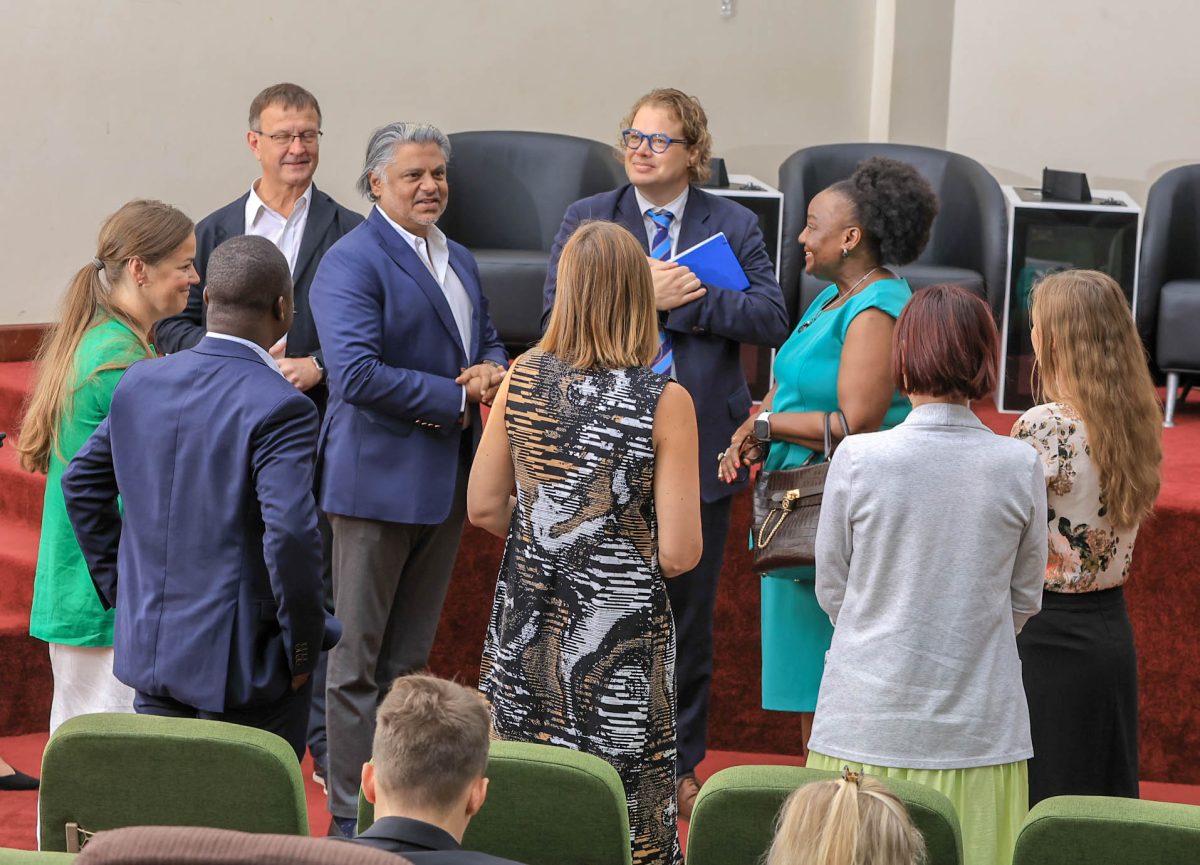
Prof. Ross, a leading global authority on e-health and head of the Digital Health Research Unit at Tallinn University of Technology, commenting on the project and the link between health and technology, stressed that while health itself is not technology, the intelligent integration of digital tools is indispensable for making healthcare more efficient, affordable, and accessible. He underscored that this collaboration marks a key step in that direction, with capacity development and academic exchange key to sustainable digital transformation.
“Capacity building is critical. In Estonia, when the nationwide health information system was being launched, about a third of the budget went into training healthcare professionals. This required training trainers first, underscoring the strategic role of academia. Estonia has a master’s programme in digital health, while Makerere University offers a blended Master of Health Informatics. Together, these programmes can expand training across Uganda and beyond,” Prof. Ross explained, adding that the collaboration also gives Estonia the chance to test digital health solutions in a large, English-speaking population, while Uganda benefits from Estonia’s decades of experience and avoids common pitfalls.
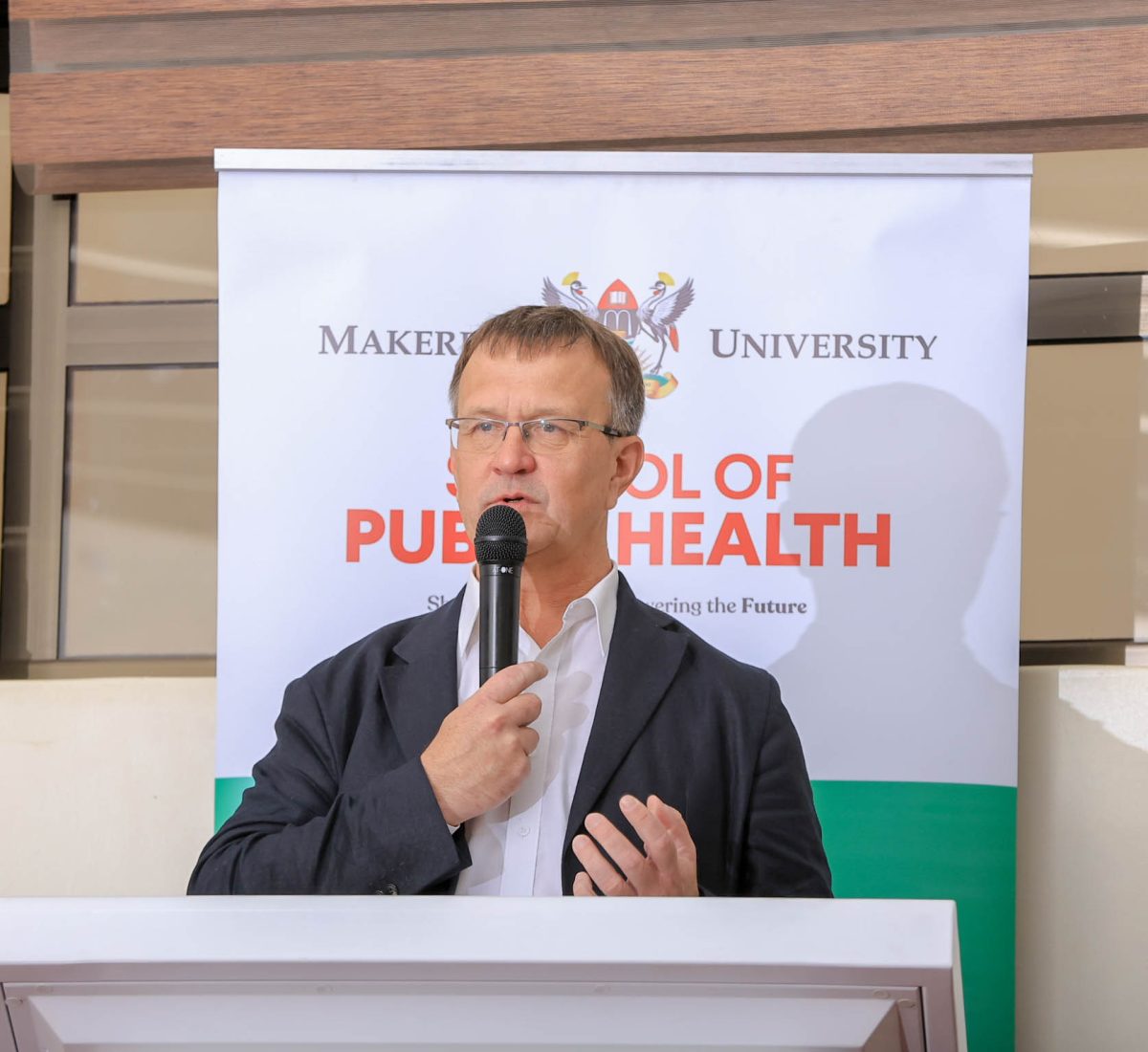
Estonia, a Northern European country currently with about 1.37 million people and covering a total area of 45,339 km², is seen as one of Europe’s leaders in digital innovation. About 99 per cent of its public services are reportedly delivered online, and its health information system records nearly every citizen’s medical history from birth to death. The X-Road platform in the country enables secure, encrypted data exchange, while e-prescriptions cover almost all prescriptions nationwide. Meanwhile, the Digilugu.ee patient portal allows citizens to access their health records, track activity logs, and even generate certificates, a system widely trusted by users. The Estonian team revealed that the integrated digital health ecosystem shows how technology, governance, and policy work together to provide efficient, patient-centred care.
Conversely, Uganda’s growing digital ecosystem makes the timing of the collaboration strategic. The country currently has more than 43 million mobile subscriptions, over 26 million internet users, and more than 33 million mobile money accounts, creating fertile ground for scaling digital health solutions. With this, strengthening health informatics will build a skilled workforce needed to design, implement, and manage these solutions effectively.
The MakSPH Project Co-lead, Prof. Tumwesigye, hailed the partnership as a turning point for the MHI programme, noting that modules such as Health Analytics are being upgraded to give students hands-on experience in developing tools to digitise public and private health systems. He said Estonia’s model, where digital innovations are widely adopted and lead to measurable improvements, offers a blueprint Uganda can adapt to move beyond paper-based systems, improve data quality, and train graduates to design solutions that strengthen health outcomes.
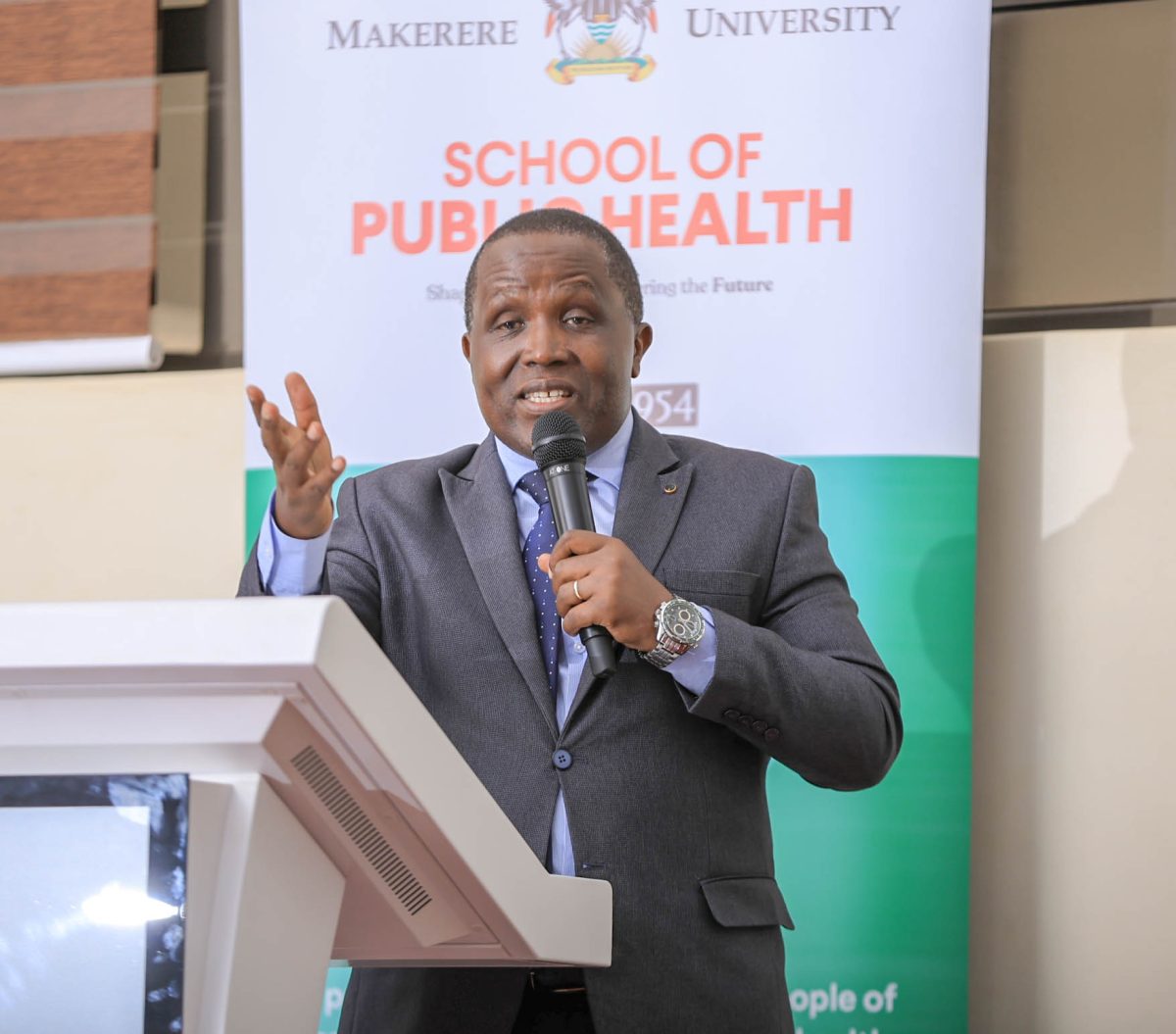
“Uganda is still behind in digital health use. We rely heavily on paper-based systems, experience long delays in transmitting data from primary health facilities to the national level, and face issues with data quality, including missing or inaccurate figures. Strengthening our programme will help address these challenges and produce graduates who can design solutions that lead to better health outcomes. Learning from TalTech University and Estonia’s digital health success will help us put Uganda on a better footing for the future,” Prof. Tumwesigye observed, noting that Estonia’s model stands out for ensuring digital innovations are widely adopted and deliver measurable improvements in health system performance.
The Programme Coordinator, Ms. Irene Wanyana, noted that since its launch in 2016, the Health Informatics training at Makerere University has made a strong impact, earning a reputation as one of the leading graduate programmes of its kind in the region. She observed that faculty members and students have been instrumental in designing, developing, and supporting national health information systems critical to Uganda’s health sector. These include UgandaEMR, an advanced electronic medical record system now deployed in more than 1,700 health facilities; the Weekly Stock Status System, which enables real-time tracking of essential medical commodities; and the Early Infant Diagnosis Laboratory Information Management System (LIMS), which improves the management of HIV testing data for infants.
Still, the programme has contributed to the development of PrEP and DREAMS/OVC tracking systems, supporting HIV prevention and care for vulnerable populations such as adolescent girls, young women, and children. The graduate training has also strengthened national HIV surveillance through the Centralised Blood Screening (CBS) dashboard, advanced the Uganda Health Information Exchange Platform to improve interoperability, and facilitated the migration of critical health data systems into the Ministry of Health’s national data centres, continuing to ensure that health information is secure, reliable, and accessible nationwide.

Ms. Wanyana is optimistic that with the new collaboration with TalTech University in Estonia, MakSPH’s Health Informatics programme is poised to deliver even greater innovations and impact to transform Uganda’s digital health system. In September 2024, four of our MHI students, Mr. Edwin Ayebare, Mr. Brian Twesigye, Mr. Enock Mwesigwa, and Mr. Iving Mumbere, won a global Award of Distinction at the Open Group India Awards for Innovation & Excellence in New Delhi. Competing against 22 university teams worldwide, they were recognised for their innovative application of enterprise architecture to address real-world health system challenges, attesting to Makerere University’s global competitiveness.
Speaking at the launch event, H.E. Girisch M. Nair, Honorary Consul of Estonia to Uganda, emphasised that Estonia’s experience offers Uganda a practical blueprint for building interoperable systems, standardising health data, and strengthening national health information infrastructure. “This collaboration is a platform for us to aspire more. Imagine a patient in Bundibugyo with a secure digital ID linked to their electronic health record. Wherever they go, authorised health workers can access their records, prescriptions are issued electronically, and medicines are dispensed at registered pharmacies. This generates rich, actionable data that helps plan better, reduce waste, and improve health outcomes.”
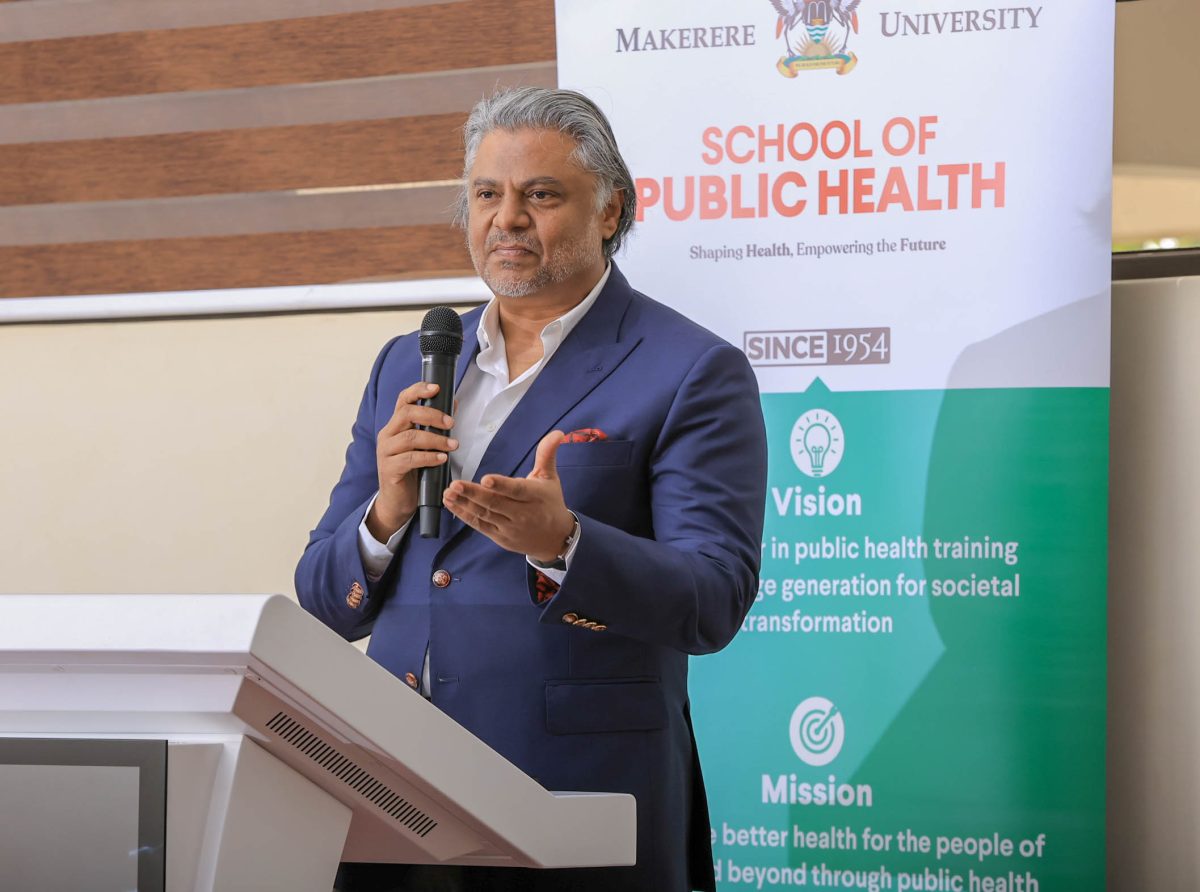
There is evidence of the Estonian Consul’s remarks. A new study conducted in 2023 by a team from Makerere University School of Public Health, led by Assoc. Prof. Peter Waiswa, published this September in BMJ Global Health, confirmed that supporting Ugandan districts to adopt digital payments significantly improved the efficiency of mass vaccination campaigns in the country, reducing delays, cutting administrative bottlenecks, and enhancing transparency. The findings from this and similar multi-country studies by the same team show that with targeted support, cashless systems are both feasible and practical for strengthening public health.
For Mr. Jamiru Mpiima, an alumnus of MakSPH and graduate of the Health Informatics programme, these developments underscore the critical need for a skilled workforce to design, implement, and manage digital health systems effectively. Speaking on behalf of Mr. Paul Mbaka, Head of the Division of Health Information at Uganda’s Ministry of Health, Mr. Mpiima shared the Ministry’s progress in digitising health information systems, from electronic medical records to the electronic community health information system, and the lessons learned along the way. He urged stronger collaboration between MakSPH and the Ministry, particularly in training future health informatics professionals and building institutional capacity to manage change in Uganda’s digital health sector transformation.
During the launch, MakSPH Dean, Prof. Rhoda Wanyenze, commended the remarkable speed of the Estonia–Makerere collaboration, noting that within a year, early conversations had already matured into a funded joint project. She emphasised that this milestone marks not just the start of a promising partnership, but also a unique opportunity to embed it more firmly within Uganda’s health system. Prof. Wanyenze called on all partners, the Ministry of Health, Makerere University, and the Estonian counterparts, to pursue a strategic tripartite arrangement, stressing that such collaboration could greatly strengthen Uganda’s digital health systems, accelerate technological innovation, and deliver measurable improvements in national health outcomes.
